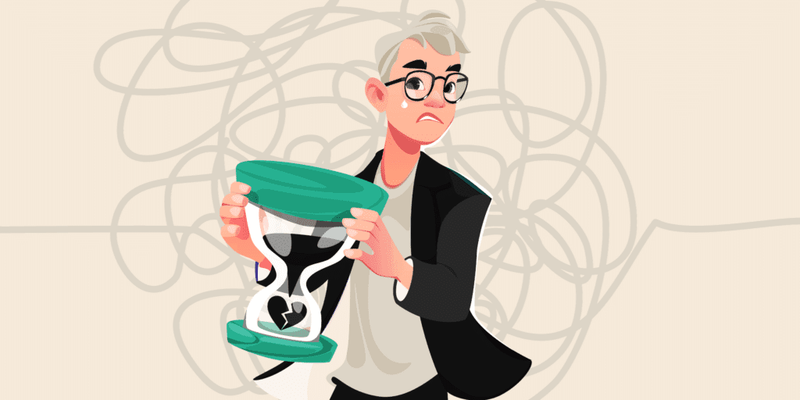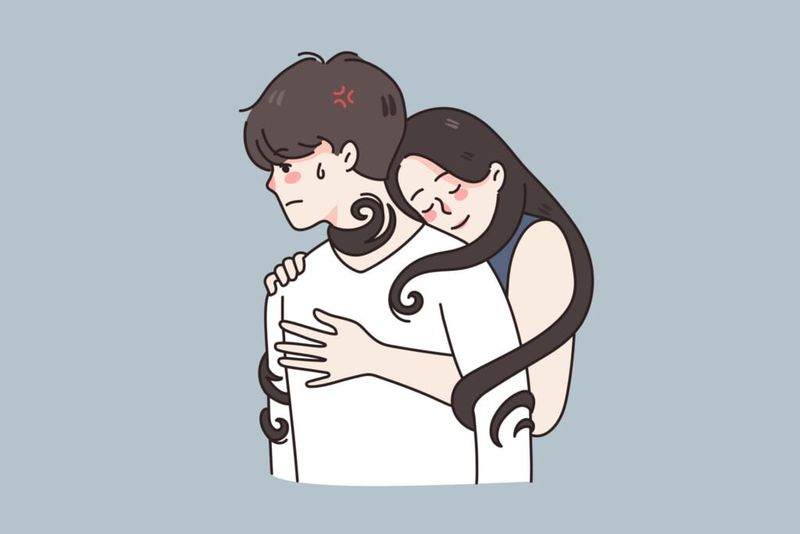17 Reasons Good Men Stay In Unhappy Relationships And What They’re Not Saying Out Loud
In the labyrinth of human emotions, men often find themselves entangled in relationships that no longer bring joy or satisfaction. While the reasons for staying may seem as complex as the human heart itself, a pattern of unspoken truths underlies the decision to remain in unhappy partnerships.
This post delves into the multifaceted motivations that bind good men to such relationships, revealing the silent sacrifices they make and the emotional burdens they bear.
1. They don’t want to hurt their partner

In the quiet moments of a relationship, some men grapple with the aching dilemma of not wanting to cause pain to their partner. Their empathetic nature often leads them to prioritize their partner’s feelings above their own, creating a cycle of silent suffering. The fear of seeing someone they care about in distress can be a powerful deterrent to leaving an unhappy situation.
While their intentions are noble, this self-sacrifice can lead to emotional exhaustion. The internal conflict between wanting personal happiness and not wanting to inflict pain becomes a heavy burden.
Ultimately, this choice reflects a deep-seated compassion that, though admirable, can keep them trapped in a relationship that no longer serves them.
2. Fear of being seen as the bad guy

The fear of being seen as the antagonist in the narrative of a relationship is a common reason men stay. They dread the judgment and backlash that might come from friends and family if they are perceived as the “bad guy” for leaving.
This fear is often rooted in societal expectations that label men as protectors and providers, making it difficult for them to step away without feeling vilified. The stigma of being the one who ‘broke’ the relationship can be crippling.
This internalized pressure to maintain a positive image often leads them to endure unhappiness rather than risk tarnishing their reputation.
3. They were taught to “stick it out” no matter what

Raised in environments where perseverance is valued, many men learn early on to “stick it out” regardless of their own feelings. This ingrained belief in commitment above all else can anchor them in relationships that have long since lost their luster.
The idea of enduring hardship as a testament to one’s character is deeply embedded, often viewed as a sign of strength. However, this mindset can trap them in cycles of dissatisfaction.
The struggle to balance culturally instilled values with personal happiness becomes an internal tug-of-war, leaving them silently yearning for change but unable to break free from old teachings.
4. Worrying about the kids more than themselves

The well-being of children often takes precedence over personal satisfaction for many fathers. They stay in unhappy relationships, driven by the belief that a stable family structure is crucial for their children’s development.
The fear that separation might disrupt their children’s lives can overshadow their own needs. They may worry about custody battles or the emotional impact on their children.
This focus on the children’s happiness over their own often leads to a life of quiet resignation, where their own emotional needs are set aside to maintain a semblance of normalcy for the sake of their kids.
5. Financial concerns that feel impossible to untangle

Financial entanglements can create a daunting barrier to leaving an unhappy relationship. The complexities of shared assets, debts, and living expenses often make the prospect of separation seem insurmountable.
For many men, the fear of financial instability or starting over on a single income is paralyzing. The thought of dividing possessions or facing potential legal battles over property can be a significant deterrent.
This financial web traps them, making the idea of leaving not just emotionally but economically challenging, forcing them to stay in situations that no longer bring joy or fulfillment.
6. Shame about failing at something important

Shame is a powerful emotion that can tether men to unhappy relationships. The fear of failing at something as significant as a partnership can be overwhelming, driving them to stay despite their dissatisfaction.
Societal expectations often equate relationship success with personal success, making the thought of leaving akin to admitting defeat. This pressure to maintain the facade of a successful relationship can be suffocating.
The struggle to reconcile personal unhappiness with the desire to appear successful in the eyes of others often leaves men stuck in relationships they no longer find fulfilling.
7. They’ve gotten used to emotional numbness

Over time, emotional numbness can become a familiar companion in an unhappy relationship. Men may find themselves desensitized to the daily grind of a joyless partnership, accepting it as the norm.
This detachment from emotions can serve as a protective mechanism, shielding them from the deeper pain of their situation. However, it also traps them in a cycle of indifference, where the prospect of change seems distant.
The comfort of routine, even if emotionally barren, can make the thought of leaving seem daunting, leading them to remain in relationships devoid of warmth or connection.
8. They feel responsible for their partner’s happiness

A profound sense of responsibility for their partner’s happiness can bind men to unhappy relationships. They often bear the weight of their partner’s emotions, feeling that their departure would shatter their partner’s world.
This self-imposed duty to be the source of joy for another can lead to quiet suffering. The fear of seeing their partner in distress can override their own need for happiness.
This misplaced sense of obligation can keep them anchored in relationships that have outlived their purpose, driven by the belief that leaving would cause irreparable harm.
9. The thought of starting over feels overwhelming

The prospect of starting over can be an intimidating thought for many men in unhappy relationships. The fear of the unknown, of having to rebuild their life from scratch, can be a significant barrier to leaving.
The comfort of familiarity, even if unfulfilling, often outweighs the uncertainty of forging a new path alone. The daunting logistics of moving, meeting new people, and redefining one’s routine can feel insurmountable.
This fear of upheaval keeps them tethered to relationships that no longer bring joy, as the security of the known pastures feels safer than the uncharted territory of a new beginning.
10. They minimize their own unhappiness

For many men, minimizing their own unhappiness becomes a coping mechanism in unwelcome relationships. They downplay their dissatisfaction, convincing themselves that things aren’t so bad, even when they clearly are.
This tendency to suppress their true feelings often stems from societal norms that discourage men from expressing vulnerability. The expectation to ‘tough it out’ can lead to internalizing their unhappiness.
By trivializing their emotions, they deny themselves the possibility of a happier existence, remaining in partnerships that are more comfortable than satisfying, bound by their own underestimation of personal discontent.
11. They’re worried no one will understand

The fear that no one will understand their predicament can isolate men in unhappy relationships. They worry that their struggles will be dismissed or misunderstood by those around them, leading to a sense of loneliness.
This fear of judgment or lack of empathy can deter them from seeking support from friends and family. The belief that their concerns will be trivialized keeps them silent.
The absence of a supportive network compounds their isolation, leaving them to navigate their dissatisfaction alone, with the hope that someone, someday might understand their silent suffering.
12. Fear of judgment from friends and family

Concern over how friends and family will perceive them can keep men in unhappy relationships. The fear of judgment, especially from those closest to them, can feel like a looming threat.
Men often worry about being seen as failures or as not living up to familial expectations. This pressure to conform to perceived standards of success and happiness can be immobilizing.
The desire to maintain a positive image in the eyes of loved ones can outweigh their own needs, binding them to partnerships that no longer bring joy, driven by the fear of external disapproval.
13. Their identity is tied to the relationship

For some men, their identity becomes inextricably linked to their relationship. The partnership becomes a defining aspect of who they are, making the thought of leaving akin to losing a part of themselves.
This deep connection can make the prospect of separation terrifying, as it would mean redefining themselves outside the confines of the relationship. The fear of losing a central part of their identity can keep them anchored.
This entwinement of self with partnership often leads to an existential dilemma, where the risk of losing oneself feels greater than the dissatisfaction they endure.
14. They don’t know what a healthy relationship looks like

Lacking a model for healthy relationships can leave men adrift in unfulfilling ones. Without a clear understanding of what a nurturing partnership entails, they may struggle to recognize their own unhappiness.
This absence of a healthy benchmark makes it challenging to gauge when to stay or leave. Past experiences and societal norms may have skewed their perception of what is acceptable.
Without this fundamental knowledge, they may remain rooted in dissatisfaction, not realizing that a healthier, more fulfilling way of relating is possible, trapped by their limited understanding of love.
15. They hope things will magically improve

An enduring hope that things might magically improve keeps many men in unhappy relationships. They cling to the belief that the situation will change for the better without any significant effort or upheaval.
This optimism, however misguided, serves as a balm for their current dissatisfaction, providing a glimmer of future happiness. They hold onto memories of better times, hoping for their return.
This hopeful illusion can create a comforting yet paralyzing inertia, preventing them from taking steps to actively change their circumstances, living in anticipation of a brighter tomorrow that never arrives.
16. They’re afraid of being alone

The fear of solitude can be a powerful motivator to stay in an unhappy relationship. The thought of facing the world alone, without the companionship they’ve grown accustomed to, can be daunting.
This fear often stems from the belief that being alone equates to failure or being undesired. The comfort of a familiar presence, even if unsatisfying, feels more secure than the unknown of solitary life.
This terror of loneliness can overshadow their desire for happiness, binding them to partnerships that no longer serve their emotional needs, driven by an overwhelming dread of isolation.
17. They confuse loyalty with love

Confusing loyalty with love can keep men trapped in relationships that fail to fulfill them. They equate remaining faithful to a partner with genuine affection, even when the emotional connection has waned.
This conflation can stem from deeply held beliefs about commitment and duty, where loyalty is seen as an ultimate expression of care. However, this can lead to staying in situations where love is no longer present.
The struggle to differentiate between steadfastness and genuine affection can bind them to relationships that have lost their spark, driven by the mistaken belief that loyalty is synonymous with love.






